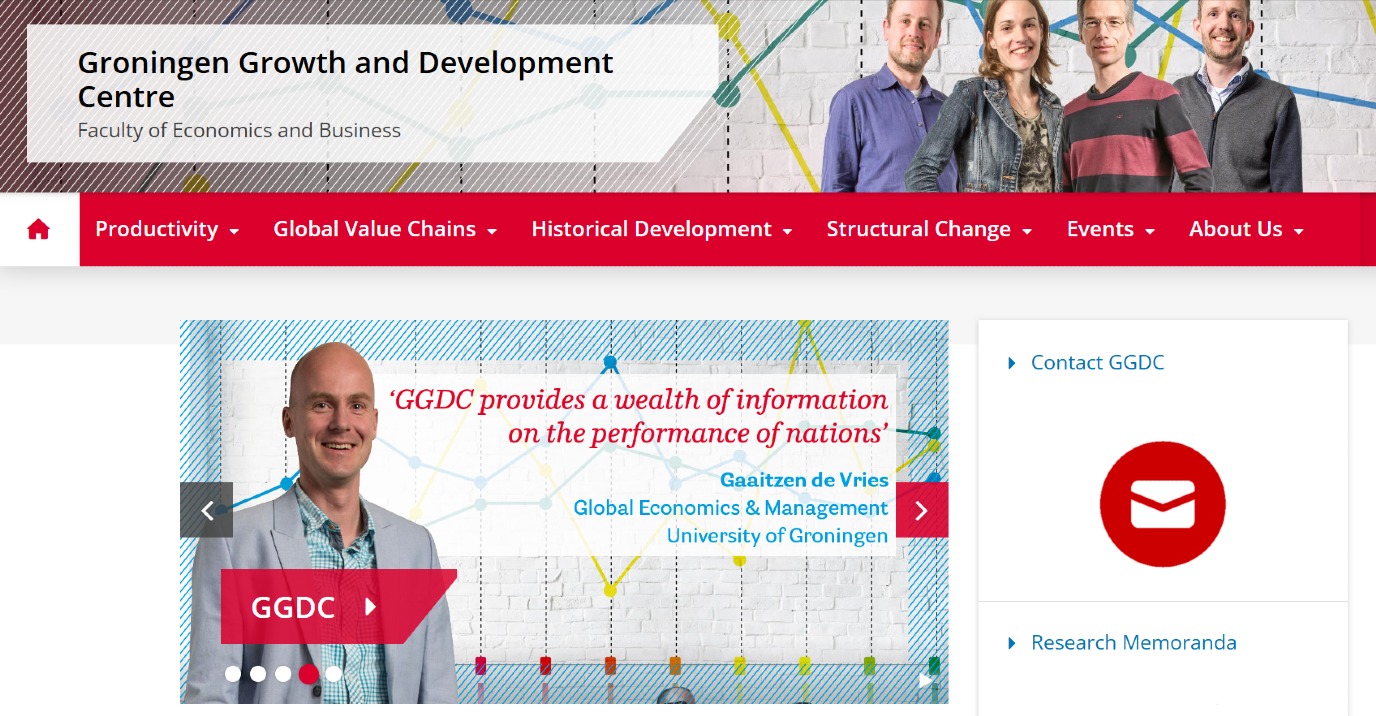Groningen Growth and Development Centre
Het GGDC is een platform voor onderzoek naar economische groei en ontwikkeling. Dit onderzoek is grotendeels gebaseerd op een reeks uitgebreide databases met indicatoren van groei en ontwikkeling die het centrum regelmatig compileert en onderhoudt. Bovendien organiseert het GGDC seminars en conferenties.
Opzet
Het Groningen Growth and Development Centre (GGDC) werd opgericht binnen de Afdeling Economie van de Universiteit van Groningen in 1992. Het is oorspronkelijk opgezet door een groep onderzoekers die werkten aan de vergelijkende analyse van economische prestaties in de loop der tijd en tussen landen, in de traditie van Angus Maddison. Inmiddels is het uitgegroeid tot een onderzoekscentrum dat de interactie van globalisering, technologie en institutionele verandering bestudeert, en de impact ervan op langetermijneconomische groei, structurele verandering, productiviteit en ongelijkheid.
Openbare informatie en datasets
Het GGDC biedt unieke informatie over vergelijkende trends in de wereldeconomie in de vorm van gemakkelijk toegankelijke datasets, samen met uitgebreide documentatie. Deze gegevens worden openbaar gemaakt, waardoor onderzoekers en beleidsmakers van over de hele wereld productiviteit, structurele verandering en economische groei in detail kunnen analyseren. Dit omvat de Penn World Tables, de World Input-Output Database (WIOD) en de Maddison Historical Statistics.
Een belangrijk doel van het GGDC is het uitvoeren en bevorderen van nieuw empirisch onderzoek dat innovatief is en tegelijkertijd beleidsrelevant. Dit gebeurt door middel van het eigen onderzoek van het GGDC, door het samenstellen van uitgebreide databases voor publiek gebruik en door (gezamenlijke) voorstellen in te dienen voor het financieren van gezamenlijk onderzoek op dit gebied. Internationale samenwerking is essentieel gezien de vergelijkende aard van het onderzoek. Het centrum organiseert ook seminars, zomerscholen en conferenties, zoals de jaarlijkse Maddison-lezingenserie.
Team
Het GGDC bestaat uit een team van senior en junior medewerkers, promovendi en ondersteunend personeel, met een groot netwerk van lokale, nationale en internationale samenwerkingspartners. De huidige directeur is prof. dr. Robert Inklaar.
Contact - Academic Lead
prof. dr. Robert Inklaar (Faculteit Economie en Bedrijfskunde)
-
Email: r.c.inklaar rug.nl
Lees Meer
Lees het interview over het Groningen Growth and Development Centre (GGDC):


